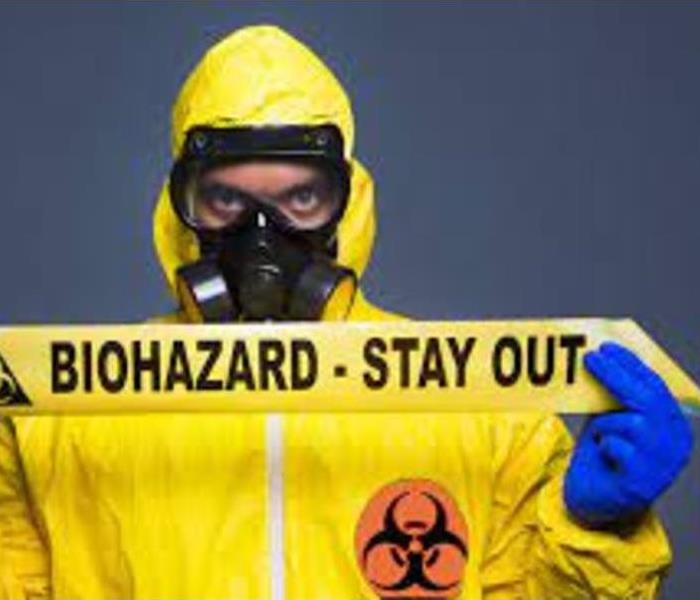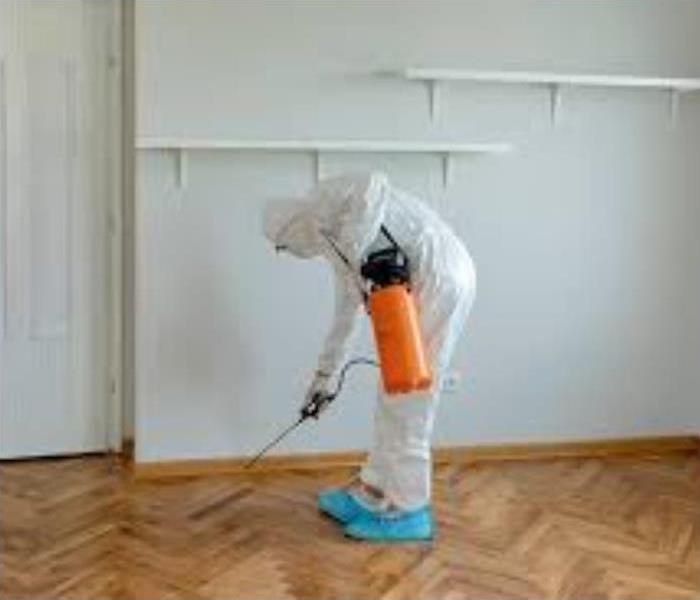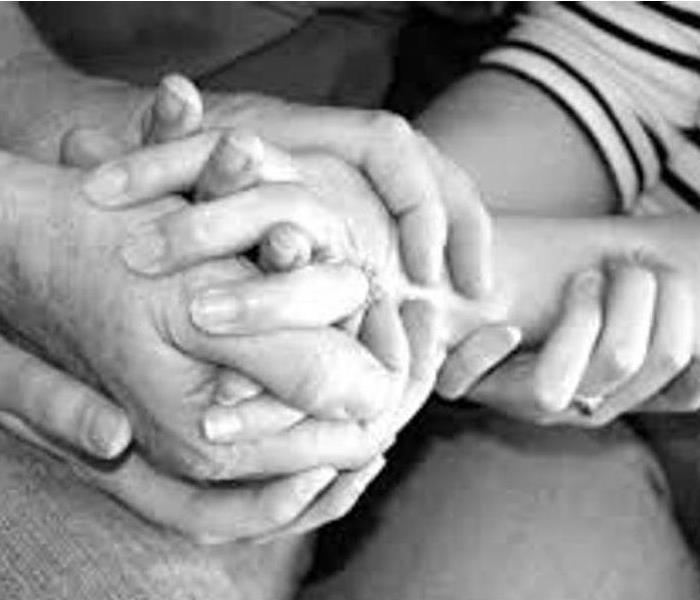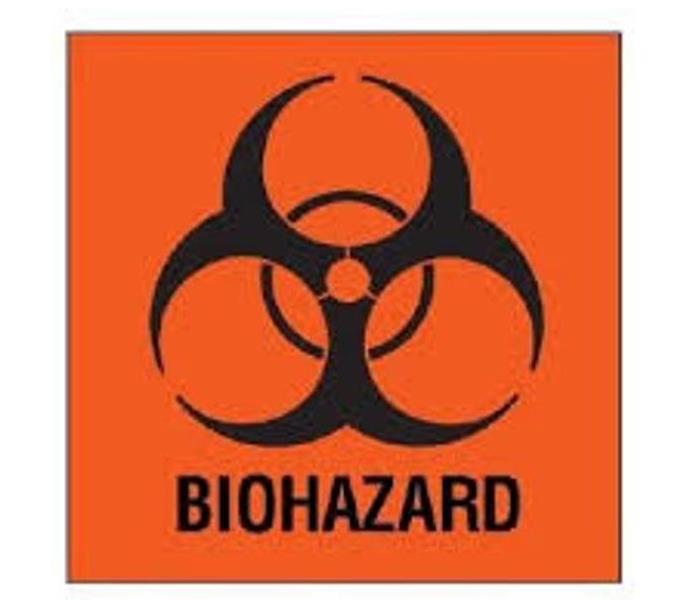Recent Biohazard Posts
Can You Clean Biohazards Yourself?
9/12/2022 (Permalink)
 Disposing of biohazards is also a minefield for people who aren’t familiar with local and national rules and regulations.
Disposing of biohazards is also a minefield for people who aren’t familiar with local and national rules and regulations.
Many property owners are tempted to try cleaning biohazards on their own in order to avoid the large accompanying expense, but we really cannot recommend a DIY approach to this cleaning task. Biohazards are nationally and internationally designated and monitored because they pose a risk to human health, and improper cleaning could put anyone who enters the premises in danger of sickness, and even death.
SERVPRO of Streamwood, Bartlett, West Chicago, and Warrenville have access to the right cleaning solutions to neutralize biohazards and eliminate risk. While vinegar might be great for cleaning your drains or making your kitchen surfaces sparkle, it isn’t very effective on human remains or chemical spills. Forensic cleaners know the right solution to use on each particular biohazard, how to apply it, and how to ensure effectiveness. Many people fail to use household cleaners properly, meaning they think surfaces are sanitized when they are not. With biohazards, that’s a chance property owners can’t afford to take.
Disposing of biohazards is also a minefield for people who aren’t familiar with local and national rules and regulations. Most hazardous material cannot be thrown out with the trash, but needs to go to a specialist facility to be incinerated. You must also use appropriate warning labels and red trash bags to warn anyone who might handle the material that it contains biohazards. Failure to identify biohazards in general waste can be a criminal matter in some jurisdictions, so it’s always a good idea to bring in expert cleaners, who know how and where to properly dispose of biohazards in order to protect yourself and your property from legal repercussions.
Crucial Steps to be Followed When Dealing with the Biohazard Cleaning Process
9/1/2022 (Permalink)
 Cleaning a biohazard is far more intensive than a regular cleaning
Cleaning a biohazard is far more intensive than a regular cleaning
Step 1: Wear appropriate PPE, including liquid/airtight clothing, goggles, respirator, gloves
Step 2: Create a clean space or control room to manage entry/exit from contaminated area
Step 3: Identify primary biohazards and area of contamination
Step 4: Remove any unsalvageable items and clean visible damage
Step 5: Continue to clean under and around damaged area, stripping back each layer of floor or wall and testing beneath
Step 6: Use UV light sources such as hydroxyl generators to sanitize and deodorize air
Step 7: Dispose of all biohazard material according to state and local regulations
Because of this, the biohazard cleanup process can be unavoidably destructive. While enzyme cleaners that react with bodily fluids or other contaminants can be used to identify areas that need to be cleaned, often a full inspection requires the removal of drywall and floorboards to check places that can’t be checked visually.
In addition to being a difficult and labor-intensive task, cleaning crime or death scenes comes with the added consideration of the human element of the people who live in or own the property. A trauma cleaner may find they need as many people skills as cleaning skills in order to handle the sensitive nature of their job. As such, the professional and job requirements for biohazard company cleaning staff are multifaceted: cleaners need to be trained in recognizing and decontaminating hazards, compassionate with property owners, and physically fit enough to put in many hours of manual work while wearing hot and restrictive clothing.
Carrying out this kind of intensive, full-property cleaning is difficult under ideal circumstances, but most hazmat cleaning is undertaken in everyday environments that were not designed to facilitate sterile cleaning. That might mean working in small or cramped quarters, navigating additional cut or trip risks such as broken glass and clutter, and having a variety of different surfaces and materials to clean.
While there is no specific governing body for biohazard cleaning, forensic cleaning companies follow state and national regulations for cleaning and disposing of each individual biohazard they encounter using guidelines from OSHA, EPA, CDC, and more.
UNDISCOVERED DEATH REMEDIATION
9/15/2021 (Permalink)
 Discovering an unattended death can be an emotionally wrenching experience.
Discovering an unattended death can be an emotionally wrenching experience.
An unattended death occurs in solitude. It often takes several days before somebody suspects that something is wrong. Sometimes it takes weeks, months and even years. When phone calls, text messages and emails go unanswered, friends, family members and landlords check in on the person at home, only to find that they’ve passed. If you’ve been in this position, you’re not alone. It happens more often than you might think.
Discovering an unattended death can be an emotionally wrenching experience. It’s even more traumatic when the victim is a loved one. Although you may feel obligated to clean up the remains yourself, there are several reasons why you shouldn’t do that.
For one, it’s dangerous. Body fluids from corpses release dangerous pathogens into the immediate area, creating a hazard for anyone without personal protective gear. To understand why this happens, you need to know how the decomposition process of the human body works. When someone dies, bacteria in the body lose the nutrients that keep them sustained. They look for other food sources to nourish themselves, and end up settling on the organs. These organs, which include the liver, the pancreas and the intestinal tract, are broken down with remarkable speed. To put this feeding process into perspective, there are trillions of bacteria in our bodies. That averages to about four pounds of bacteria for a 200-pound adult. Operating all at once, bacteria remove all the organs from the body within a 48-hour window.
Depending on the temperature and humidity of the room, the skin will begin to tear within this timeframe, allowing biohazardous materials to seep from the body. Rising pressure from the body’s gasses will quicken the process, releasing a terrible odor that’s often referred to as the stench of death. Sometimes, these gases will even cause the body to explode. As harmful pathogens pool on the floor, they release noxious gasses into the air, which can be inhaled through the nose and mouth. People who haven’t been trained to deal with biohazards should remove themselves from the scene to escape these fumes and other threats from the decomposing body. Although it may not be obvious, people who approach a body without safety equipment risk exposing themselves to disease. Proper precautions must be taken, which brings us to another reason you shouldn’t embark on this endeavor yourself.
You likely don’t have the training or equipment to safely dispose of human remains. Gloves, goggles, respirators and body suits are necessary to protect yourself against airborne and bloodborne pathogens. But they’re not enough to keep you safe. SERVPRO of Streamwood, Bartlett West Chicago & Warrenville follows a regimented process to sanitize the area safely and effectively. The chemicals allotted to clean decomposing bodies are regulated by the state. Thus, over-the-counter solutions simply aren’t powerful enough to remove and decontaminate body fluids soaked into the floor. While a surface may look clean, harmful pathogens will linger behind and pose a threat to others if the proper chemicals haven’t been used. SERVPRO of Streamwood, Bartlett West Chicago & Warrenville uses certified technicians that have the training and materials to thoroughly sanitize and disinfect an area contaminated by biohazardous waste. Moreover, they carry chemicals that can effectively deodorize the scene, which often proves difficult to do for death odors.
You also don’t want to clean up human remains if you’re connected to the deceased. If you do so, you will only exacerbate your trauma and prolong your grief. Asking SERVPRO of Streamwood, Bartlett West Chicago & Warrenville to take care of the task will not only spare you additional anguish, it will leave you assured that the job is done right.
CRIME SCENE – CAN'T I TAKE CARE OF IT MYSELF?
9/1/2021 (Permalink)
 Cleaning up a crime scene.
Cleaning up a crime scene.
If you find yourself looking at a crime scene, your initial reaction may be to clean it yourself. You may want it to be gone as soon as possible and that's completely understandable. Here are some reasons why you shouldn't do that.
1. Fluids! Coming into contact with bodily fluids, especially blood, can be harmful. It can carry diseases and pathogens that you just don't want on or near your body!
2. Invisible to the eye! If you don't take care of all of it, you can still receive harmful effects. This means if you try and clean it and leave behind any traces of the scene (even germs and pathogens you can't see), your home won't be as sanitary as you think it is. You know how they say won't you don't know won't hurt you? Well, in this case, it can.
3. Don't stress! While you may be worried that you can't afford crime scene cleaners, your insurance may take care of it! Don't let this detail keep you from getting the professionals atSERVPRO of Streamwood, Bartlett, West Chicago, and Warrenville in the door!
Never try to clean a crime scene yourself! You'll be happier, more sanitary, and less stressed when you let the professionals come to take care of it. Please contact SERVPRO of Streamwood, Bartlett, West Chicago, and Warrenville if you need help with any type of biohazard clean-up job no matter how big or small you may think the job is.
Biohazard Handling Tips
9/2/2020 (Permalink)
 Know what to do if you think you have a biohazard situation.
Know what to do if you think you have a biohazard situation.
There are certain rules and regulations surrounding biohazard cleanup. That’s why only certified and highly trained restoration technicians from SERVPRO of Kendall County should handle biological hazards. We use the most advanced restoration equipment to eliminate contamination and clean any such ordeal. SERVPRO of Kendall County excels at handling biohazard cleanup and restoration.
There is no situation in which biohazard contamination is not considered a risk. Even minor biological hazards pose a health risk – numerous diseases, viruses, and infections are passed through blood, bodily fluids, and waste. That’s why only certified restoration experts should handle the damage.
Before a SERVPRO biohazard cleanup crew can arrive, however, you’ll be left with the mess on your own. Here are a few biohazard safety tips to help in the interim.
After a contamanation
Your primary focus, during any biohazard or sewage contamination event, should be the safety of both yourself and your family.
- Remain clear of the affected area.
- Call for emergency service is anyone is injured.
- Treat all bodily fluids on the scene as if they were highly contaminated.
- Shut off the HVAC system in case of airborne pollutants or sewage damage.
 Disposing of biohazards is also a minefield for people who aren’t familiar with local and national rules and regulations.
Disposing of biohazards is also a minefield for people who aren’t familiar with local and national rules and regulations.





 24/7 Emergency Service
24/7 Emergency Service



